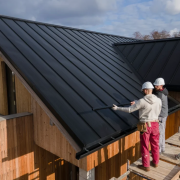Most insurers offer water damage insurance to cover any sudden and unintentional disaster. However, this will not apply to any damage caused by negligence. This may seem simple enough, but it can eventually become confusing. To prevent this from happening, ask your insurance agent to provide you with a clear explanation of your policy’s details.
Insurance Policies and Water Damage
Up to now, there has been a debate on whether homeowner insurance can cover water damage. The short answer is yes, but only if the damage falls within one of the following conditions:
1. Accidental and Sudden
Water damage must have occurred within the house for the property to be covered. Insurance companies will pay for the repair of damaged flooring, for example, if this was due to a leak in the water heater. However, the cost of fixing or repairing the unit is not included.
In this type of water damage insurance policy, an additional condition must also be present: the water that leaked from the heater must not have reached the ground for the coverage to apply.
2. Extreme Weather
This type of insurance covers water damage if trees fall and cause damage to your pipes or if rainwater enters your house. The insurer will pay for the repair costs of either the pipe or the house, but not both.
3. Fire-initiated Water Damage
Water used to extinguish a fire can cause property damage and personal injury. If the pressure from a fire hose damages your home instead of saving it, you have a good reason to file an insurance claim.
After the fire has been extinguished, take pictures or note the water damage that your property sustained. List all the damaged items and appliances in the house. All of these, along with the photos and even videos, should be part of your water damage claim file. Once submitted to your insurer, they should help speed up your insurance claims application.
4. Mold Growth
Many water damage incidents often lead to mold growth. The spores of this fungus can quickly grow in your home 24 hours after suffering from water damage. If left untreated, molds can further damage your wood, drywall, and floorboards. The good news is that most insurance policies will cover mold growth caused by water damage.
It’s important to take photos or document the damage caused by molds on your property for a successful insurance claim. It is also a good idea to make a list of all the home areas where molds have grown after water damage. Properly document anything the mold affected.
5. Vandalism
The vandalism and the intentional destruction of water facilities by unidentified people is a growing crime. However, this is rarely used as a reason for filing an insurance claim under water damage. Yet coverage is often extended in this case.
Destruction of metal water pipes and fittings, including manhole covers, exposes the sewers to serious disrepair, making them vulnerable to water damage. Nevertheless, there is little documentation showing that reduced cases of vandalism can result in better water and sanitation services.
Uninsurable Water Damage Conditions
Unexpected events that lead to water damage are normally covered by insurance. However, you won’t get coverage for events that have not yet happened but are likely to occur soon. Also, an insurance company won’t pay you for any inconvenience caused by a problem that you could have prevented but did not. The following falls under this condition:
1. Plumbing Maintenance
Flooring damaged by an overflowing washer will be covered, confirms one water damage restoration Colorado Springs professional. However, if your insurance company finds out that the overflow happened because your washer did not have regular maintenance, you won’t get paid for the cost of fixing the damaged flooring.
2. Repair and Replacement
Many water damage insurance policies cover water damage to your home caused by a leaking water heater. However, your coverage does not apply to the cost of repairing or replacing the leaky unit.
3. Sewage Backups
Most standard insurance policies have a clause that states that water damage from a sewage backup is not covered. However, homeowners can often get an endorsement from their insurance companies to allow sewage backup to be included in their water damage insurance policy. However, this will usually entail additional costs.
4. Flood
Flood is typically not covered by insurance policies for water damage. This is because there is a separate flood insurance policy that provides protection against this natural disaster.
Key Takeaway
An insurance policy is a powerful way to protect yourself, your family, and your property from natural disasters. Water damage, however, is unique in that it requires you to meet certain conditions before your insurance claim is approved.
Given this, it is important that you first determine which water damage conditions are covered and which are not before getting the desired insurance policy. This will help you choose the right type of water damage insurance for your unique situation.













Comments